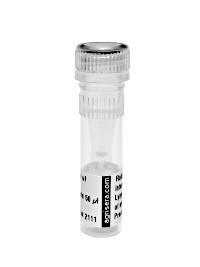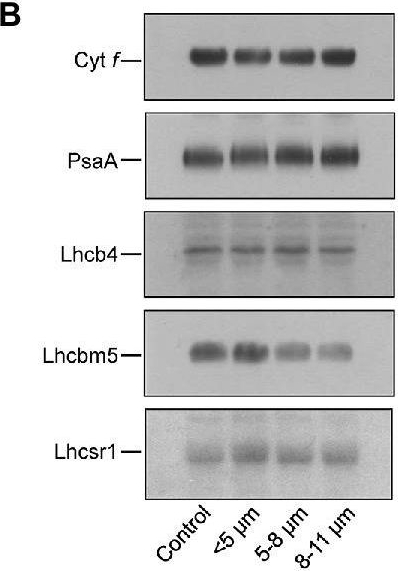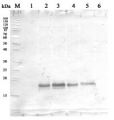1

Anti-Lhcb4 | CP29 (Lhcb4) homolog, Chlamydomonas
AS06 117 | Clonality: Polyclonal | Host: Rabbit | Reactivity: Chlamydomonas reinhardtii, Chlorella vulgaris
- Product Info
-
Immunogen: KLH-conjugated synthetic peptide derived from Lhcb4 (CP29, Lhcbm4) protein sequence from Chlamydomonas reinhardtii Q93WD2
Host: Rabbit Clonality: Polyclonal Purity: Serum Format: Lyophilized Quantity: 100 µl Reconstitution: For reconstitution add 100 µl of sterile water Storage: Store lyophilized/reconstituted at -20°C; once reconstituted make aliquots to avoid repeated freeze-thaw cycles. Please remember to spin the tubes briefly prior to opening them to avoid any losses that might occur from material adhering to the cap or sides of the tube. Tested applications: Western blot (WB) Recommended dilution: 1 : 10 000 (WB) Expected | apparent MW: 29 for Chlamydomonas reinhardtii
- Reactivity
-
Confirmed reactivity: Chlamydomonas reinhardtii, Chlorella vulgaris
Predicted reactivity: Gonium pectorale, Tetrabaena socialis
Species of your interest not listed? Contact usNot reactive in: For Lhcb4 protein detection in higher plants use antibody: AS04 045 Anti-Lhcb4 | CP29 chlorophyll a/b binding protein of plant PSII, rabbit antibodies - Application Examples
-
Application examples: 
Reactant: Chlamydomonas reinhardtii (Green Alga)
Application: Western Blotting
Pudmed ID: 36119589
Journal: Front Plant Sci
Figure Number: 10B
Published Date: 2022-09-20
First Author: Szyszka-Mroz, B.
Impact Factor: 6.308
Open PublicationCoomassie stained SDS-PAGE analysis of thylakoid membrane proteins from control and different-sized cell fractions of C. priscuii(A). Lanes of SDS-PAGE were loaded on an equal Chl basis. Values on the left indicate apparent molecular mass (kDa). B – Representative Western blots (B) and densitometric analysis (C) of polypeptides probed with antibodies raised against Cyt f, Lhcbm5, Lhcb4, and PsaA polypeptides in thylakoid membranes isolated from different-sized cell fractions of C. priscuii. Mean values ± SE were calculated from 3 independent experiments. The presented data were normalized to the relative abundance of the respective polypeptides in the control whole cell fraction.
- Background
-
Background: Lhcb4 (CP29) is a member of the family of chlorophyll a/b-binding proteins, which is conserved in higher plants and green algae. Lhcb4 is associated with Photosystem II serving both as a light-harvesting antenna protein as well as playing a role in photoprotective dissipation of excitation energy. The Chlamydomonas homolog of plant Lhcb4 has also been denoted as Lhcbm4.
- Product Citations
-
Selected references: Cecchin et al (2021) LPA2 protein is involved in photosystem II assembly in Chlamydomonas reinhardtii. Plant J. 2021 Jul 4. doi: 10.1111/tpj.15405. Epub ahead of print. PMID: 34218480.
Koh et al. (2019). Heterologous synthesis of chlorophyll b in Nannochloropsis salina enhances growth and lipid production by increasing photosynthetic efficiency. Biotechnol Biofuels. 2019 May 14;12:122. doi: 10.1186/s13068-019-1462-3. eCollection 2019.
Jeong et al. (2017). Deletion of the chloroplast LTD protein impedes LHCI import and PSI-LHCI assembly in Chlamydomonas reinhardtii. J Exp Bot. 2017 Dec 30. doi: 10.1093/jxb/erx457.
Shin et al. (2017), Complementation of a mutation in CpSRP43 causing partial truncation of light-harvesting chlorophyll antenna in Chlorella vulgaris. Sci Rep. 2017 Dec 20;7(1):17929. doi:10.1038/s41598-017-18221-0.
Muranaka et al. (2015). TEF30 interacts with photosystem II monomers and is involved in the repair of photodamaged photosystem II in Chlamydomonas reinhardtii. Plant Physiol. 2015 Dec 7. pii: pp.01458.2015.
Drop et. al (2014). Consequences of state transitions on the structural and functional organization of Photosystem I in the green alga Chlamydomonas reinhardtii. Plant J. 2014 Feb 8. doi: 10.1111/tpj.12459. - Protocols
-
Agrisera Western Blot protocol and video tutorials
Protocols to work with plant and algal protein extracts - Reviews:
-
This product doesn't have any reviews.


